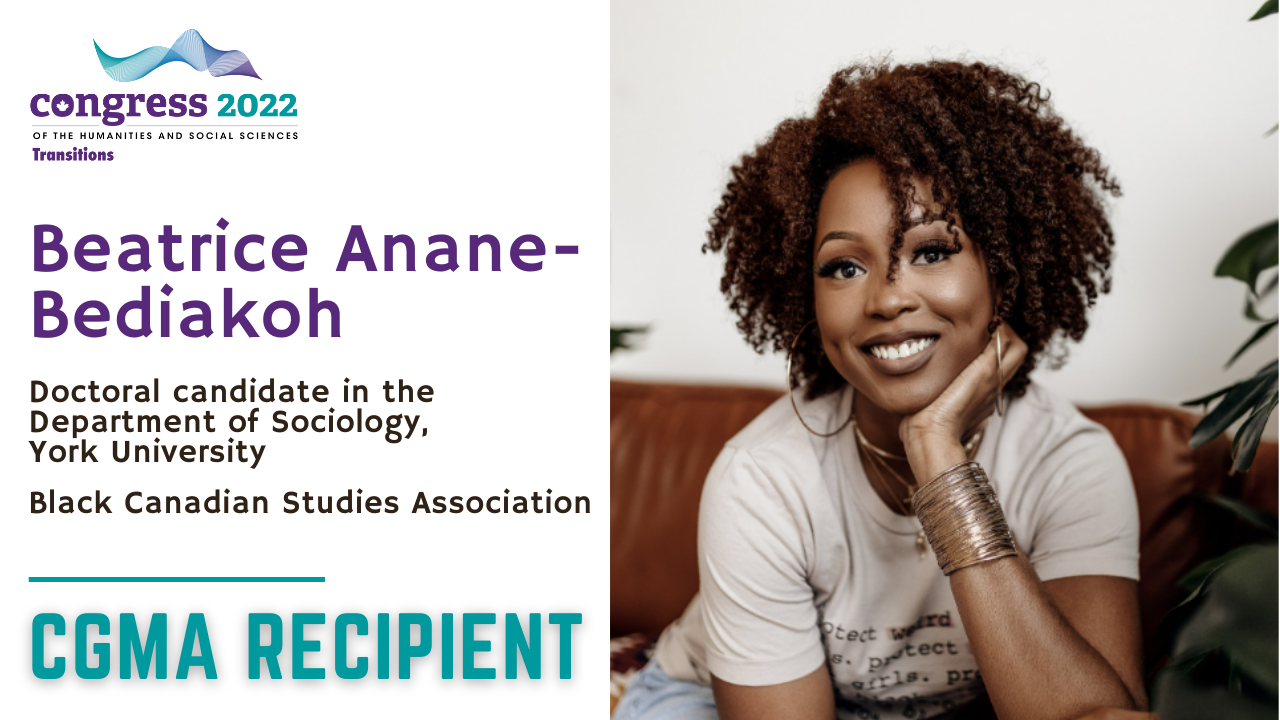Nominated by member scholarly associations of the Federation for the Humanities and Social Sciences, the 2022 Congress Graduate Merit Awards recognize exceptional graduate students who will be presenting their work at the Congress of the Humanities and Social Sciences.

Tell us about yourself.
I am a doctoral candidate in the Department of Sociology at York University. I hold a Master of Education in Humanities, Social Science, and Social Justice Education from the University of Toronto (OISE) and earned my Hons. Bachelor of Arts in Sociology from Wilfrid Laurier University. My interests include race and racialization, Black geographies, and the spatialization of race.
List the scholarly association(s) of which you are currently a member.
I am a member of the Black Canadian Studies Association (BCSA), Canadian Sociological Association (CSA) and the International Sociological Association (ISA): 2019
At which conference(s) will you be presenting and/or attending?
I will be presenting at the Black Canadian Studies Association.
What is the title of your Congress 2022 presentation?
My presentation is entitled, “Under the conditions of removal: Green dispossession, white gentrification, and Black elimination”
How would you describe the research you will be presenting at Congress 2022?
Drawing on Ananya Roy’s concept of racial banishment (a framework that emphasizes state-instituted violence against racialized bodies and communities), I argue that this concept allows us to see in Canada, how sanitized notions of gentrification (i.e., urban renewal and revitalization projects) are not merely a practice of capital accumulation, but violent acts of dispossession that materially and discursively work to (re)present Canadian landscapes bringing into focus the legal disappearance of African/Black Canadians in geography. I pay particular attention to key contemporary sites of dispossession through which racialized techniques of removal are practiced, enacted, and narrated to structure geographic domination.
How does the research you will be presenting connect with the Congress 2022 theme, Transitions?
Given that the goal this year is to “inspire ideas, dialogue, and action”, I want to invite members and the larger humanities community to take seriously the world we inhabit, that displaces millions of Black/African descendants from geographical space(s). To recognize that the contemporary uprootedness and displacement of Black geographies and communities are underscored by histories of colonialism, transatlantic enslavement, resistance to white supremacy and globalized racism. So “to better build a future that is more diverse, sustainable, democratic, and just” actions that move beyond performance need to take place.
What is your favourite part of the Congress experience?
My favourite part of the Congress experience is networking. The opportunity to connect and step out of my own area of expertise has been fruitful for my learning. Through Congress, I have met and have now formed close relationships with a few colleagues conducting ground-breaking research.
Share your hopes for Congress 2022.
My hope for Congress 2022 is for learners to delve into new and challenging conversations that provoke status-quo assumptions, in hopes of providing a critical lens to their lived realities.
